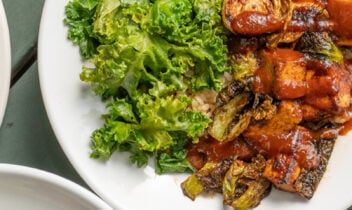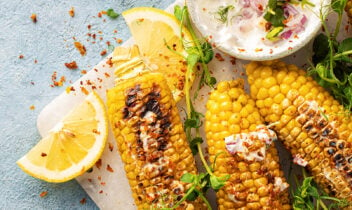
How To Go Further With Fruits & Veggies All Year Long!
We celebrate National Nutrition Month® every March and this year’s theme was to “Go Further with Food.” March has come and gone, but you may still be wondering how to put this theme into practice to impact your health through the foods you eat. Well, nothing helps you “go further” in your day and overall health more than the vital micronutrients found in fruits and vegetables. Plus, plant-based foods help you “go further” to support your environment and local economy. Here are some ways you can keep National Nutrition Month® alive throughout the year and “Go Further with Food.”
4 Ways to Go Further with Fruits & Veggies
- Add Produce to Breakfast. Your energy will “go further” when you eat a balanced breakfast that incudes fruits and vegetables. Eating breakfast helps with brain function, attention span, concentration and memory, and can reduce irritability and tiredness. Studies show that eating breakfast jumpstarts your metabolism and helps prevent overeating later in the day. For many of us, fruit is a breakfast staple, but the first meal of the day is a great time to include vegetables as well. Try avocado toast, tossing peppers and onions in your eggs, or adding spinach to your morning smoothie.
- Focus on Fiber. Another way to “go further” in your day, is to stay satisfied with fiber-rich fruits and vegetables at meals and snacks. Try to include at least 3 food groups in your meal including a lean protein and a high fiber carbohydrate. This dynamic duo not only provides nutrients, but gives sustainable energy and keeps you fuller longer so you can tackle your day. Nearly all produce is high in fiber to provide the perfect balance and satiety. For additional fiber, eat your fruits and vegetables with the skin on.
- Buy Local and In Season. Make it your goal to learn more about the fruits and vegetables that are offered locally in your region and focus on eating according to the season. When produce is in season, it is at peak nutritional value and is typically more affordable and tasty. Canned and frozen produce are also nutritious, budget-friendly options, as these foods are canned or blast-frozen within hours after harvest.
- Avoid Waste. Try to reduce unnecessary food spoilage by planning healthy meals that include all food groups, but also incorporate foods you already have in your refrigerator or pantry. Many times, fresh produce is wasted if it is not used or stored properly. Including economical purchases of frozen, canned, and dried produce and 100% fruit juice, can help you “go further” to avoid waste and stick to your budget. In addition, consider recycling containers and donating unused food to a food bank.
These tips not only have a positive impact on your personal health, but can positively influence public and environmental health as well. “Go further” with fruits and vegetables all year long!


